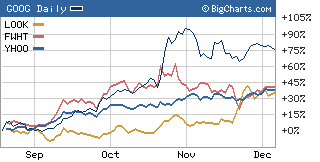
NEW YORK (CNN/Money) -
Bill Clinton was president at a time when Internet companies enjoyed an inordinate amount of hype.
So it seems fitting that the former president spoke at a swank party at New York City's Tavern on the Green Monday to celebrate the launch of a new search engine, Accoona. In a speech on how technology can serve the greater good, Clinton joked about the good old days.
"I hope you all make a lot of money and that you're very successful," Clinton quipped. "I hope you get a big runup in the stock price." (The company said it a made a donation of an undisclosed sum to the William J. Clinton Foundation.)
Accoona is not public...yet. But it's hard to imagine the company isn't thinking of an initial public offering.
Thanks to the triumphant IPO of Google in August, there will probably be a lot of companies aiming to cash in on the paid search craze.
"Nothing succeeds like excess so there will certainly be imitators. It will be like mushrooms after a rainstorm. They'll be popping up all over the place," said David Garrity, an analyst with Caris & Co.
So what makes Accoona unique?
Better than Google?
Accoona claims to have search technology that will be more efficient than the likes of Google, Yahoo! and Microsoft's MSN. The company said it is using artificial intelligence technology to derive the meaning of words typed into a search.
 |
|
| Bill Clinton, speaking at Accoona's launch party Monday night, performed the first search on Accoona at the event. |
The company, which took its name from the Swahili phrase "Hakuna Matata" made popular in the Disney movie "The Lion King", also is touting two other features that are lacking on competing search engines: a business profile search and a so-called SuperTarget feature.
The business profile search is interesting. It allows users to type in a corporate name and next to the search results is a box that you can click on to get pertinent information (such as contact info, annual sales and company size) without leaving the search results page.
But there are a few kinks.
| More about Internet search
|

|
|
|
|
For example, when I did a business profile search on Coca-Cola Monday, the first result I got was for a Miles Ahead Entertainment, which runs the Coca-Cola Apollo Theater Academy. Next was Farmington Coca-Cola, a distributor of Coke products in Farmington, Maine.
It wasn't until the sixth search result that I got the actual Web site for The Coca-Cola Company of Atlanta, Georgia.
"Sometimes less relevant results will be served," said Jonathan McCann, an executive director with Accoona. "We are busily focusing on internally prioritizing Fortune 1000 companies for the rankings."
The SuperTarget function is also noteworthy. It enables users to rank specific keywords more highly than others. For example, if you do a search for "Yankees + Giambi + steroids", you then have an option of clicking on one of those keywords to find more relevant results.
It will be tough to beat the Big 3
Accoona has other things that help it stand apart.
 |
|
| With Internet search stocks surging, it's no wonder that startups are hoping to get a piece of the action. |
Accoona's chairman is Eckhard Pfeiffer, formerly the CEO of Compaq Computer. Pfeiffer owns an equity stake. That's impressive.
The company, which McCann said has raised $15 million in a few months, also has the backing of the Chinese government. The China Daily Information Company, the official English language Web site in China, owns about a 10 percent stake in Accoona, McCann said.
Pfeiffer said he hopes that the company's close relationship with China and the fact that it is a huge, and largely untapped market for search will give Accoona a leg up on other search rivals.
That may be a big advantage for Accoona. Still, it was slightly alarming to hear Pfeiffer, who experienced the tech bubble and resulting meltdown firsthand, succumb to late 1990's hyperbole.
| Recently in Tech Biz
|

|
|
|
|
"I believe that when the history books look at Accoona's artificial intelligence technology, it will be viewed as a milestone in the way people look at the Web," Pfeiffer said.
Accoona has some compelling technology but it isn't exactly reinventing the search wheel.
The company, which hopes to make money from paid search results, is partnering with Yahoo!'s Overture Services division for sponsored search links instead of building its own network of advertisers. So Yahoo! will benefit if Accoona does well.
And now that Google is public, it, like Yahoo! and Microsoft, has a lot more cash at its disposal to spend on research and development than private upstarts. So what's to stop any of them from replicating (or bettering) Accoona's capabilities?
"Trying to "out-Google" Google in terms of search technology quality is going to be tough," said Frank Anderson, chief executive officer of Blingo, another new search engine that will launch this week.
So if that's the case, what's Blingo's selling point? Anderson said he hopes Blingo can lure users with the potential of prizes. People will be eligible to win free stuff, such as CDs or movie tickets, when they conduct a search on the site.
But like Accoona, Anderson said Blingo expects to generate most of its revenue through sponsored links...and it's using software from Google to serve those ads.
Clearly, people think there's enough search-advertising money to go around to create viable businesses. But I think investors should be extremely cautious if there's a wave of search IPOs in the near future.
Unless Accoona, Blingo or other startups invent something that is truly revolutionary, it is going to be tough for any of the new search companies to really challenge the search world's Big Three.
"The dominance that Google, Yahoo! and MSN have is such that unless there is a meaningful technological advance, it's hard to imagine that a new broad scale search competitor can arise," Garrity said.
Sign up to receive the Tech Investor column by e-mail.
Plus, see more tech commentary and get the latest tech news.

|

